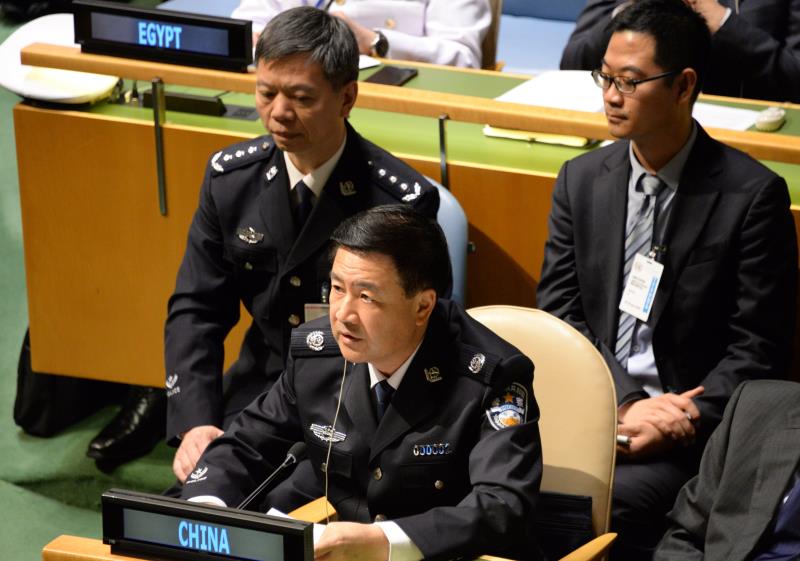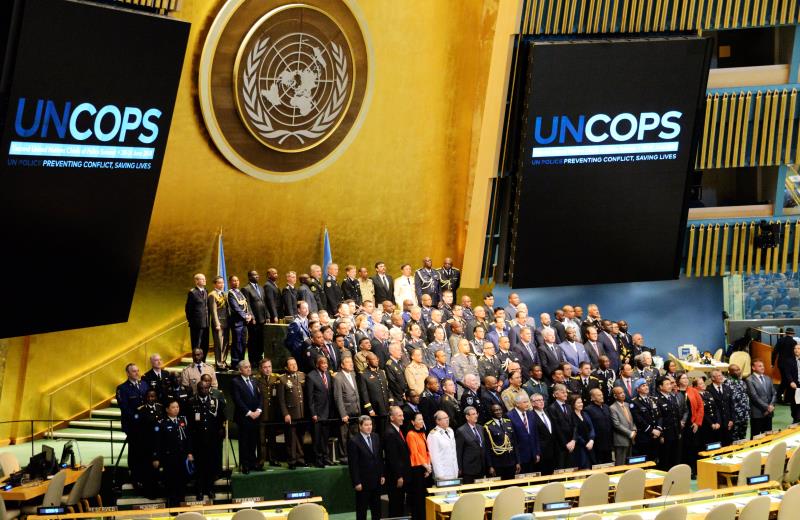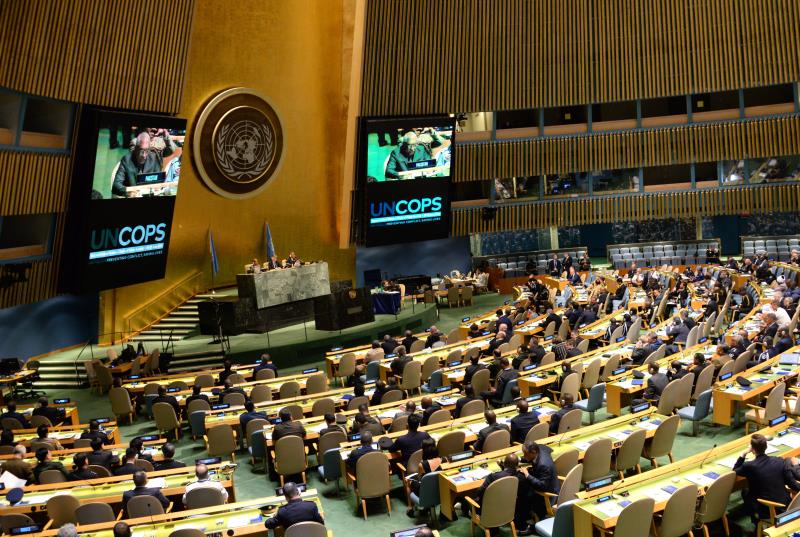
Wang Xiaohong, executive vice minister of China’s Ministry of Public Security, speaks during the Second United Nations Chiefs of Police Summit (UNCOPS) at the UN Headquarters in New York. (Photo: Yin Miao)
New York (People’s Daily) – Wang Xiaohong, executive vice minister of China’s Ministry of Public Security, delivered a speech emphasizing his country’s role in worldwide peacekeeping duties and the need for international cooperation on Thursday during the Second United Nations Chiefs of Police Summit (UNCOPS) at the UN Headquarters in New York.
“This event is taking place at a time when the global security landscape is becoming more complex,” Wang said. “The timing is right, making the event highly relevant for better global security governance.”
Wang said that China has had a history of contributing to peacekeeping operations. He mentioned a UN Peacekeeping Summit in 2015, where Chinese President Xi Jinping vowed to establish a large peacekeeping police force. Since Xi’s pledge, China has trained two standby Formed Police Units (FPUs) with a strength of 330 officers. The country has also helped train more than 400 foreign peacekeeping police officers.

A group photo of the representatives at the Second United Nations Police Summit. (Photo: Yin Miao)
Wang said that humanity has only one home and that all countries share a common destiny that links everyone together. He said all nations should subscribe to a new security doctrine of commonality, comprehensiveness, cooperativeness, and sustainability. Wang said cooperation through this new idea of universal security will create a “shared future for humankind.”
Wang also proposed the following peacekeeping objectives: strengthening the capacity of host countries for securing mission areas; supporting the UN in playing a bigger role in peacekeeping and building and supporting the UN Secretary General; and comprehensively elevating the capabilities of the peacekeeping police.

The United Nations Headquarters in New York during the Second United Nations Chiefs of Police Summit (UNCOPS). (Photo: Yin Miao)
Wang said capacity building for host countries should be made an important task in peacekeeping. Since no peacekeeping mission lasts forever, Wang said host countries cannot rely on external forces to maintain long-term internal security. So, Wang said the key is to improve their own policing capabilities. Wang suggested that before deployment, during the operation and after the closure of the UN mission, the host country should be provided with systematic training and equipment support.
The UN and its Member States should prioritize and strengthen preventive diplomacy and, before deploying a mission, send training and other teams to the host country to help them build law enforcement forces, such as riot police. During peacekeeping operations, the police-contributing countries (PCCs) should carry out training for local enforcement personnel. After the mission is closed, capacity building and technical support should continue in order to ensure that the host government can keep its country secure. Wang noted that last year, with UN authorization, China saw positive results after training Liberia’s national riot police unit.
Wang said support for peacekeeping, peacebuilding, and UN Secretary General Antonio Guterres is another important aspect toward reforming the UN’s peace and security architecture. He mentioned that the UN Charter and Hammarskjold’s three principles of UN peacekeeping operations should be strictly upheld, and host countries’ sovereignty and the will of their people should be respected. He also said that China proposes regional organizations, such as the African Union (AU), be given an effective role to play, since most of the missions take place in Africa.
Wang’s final proposal focused on improving the capabilities of its peacekeeping police. He said that the selection and performance review criteria should be held to the highest standards to ensure competency, ethics, and discipline of its officers. Wang said that utilizing new technology, such as advanced warning systems and high-caliber weapons, would help maintain the efficiency of these police officers.
Wang also said that the views voiced by PCCs should be given increased attention in their meetings with the UN Security Council and Secretariat.
During the same meeting, Wang added that China is willing to make several new commitments.
Wang said that China will invest more in capacity building. He said the country aims to host more UN workshops and provide mobile training teams, with help from the UN, to train more peacekeeping officers. Wang said the priority for this training program will be given to African countries, to improve their law enforcement capabilities.
Wang mentioned that China is ready to provide funding for the next UNCOPS and help create a mechanism to implement the agreed outcomes of the meetings. He said this mechanism will help translate these outcomes into action for the benefit of global security governance.
He said China pledged to provide the UN with more human resources support, including senior personnel and junior professionals as well as training for female peacekeeping officers.
Wang also said China is happy to share its experience and practices with other countries in terms of discipline and ethics management. He said China’s sterling record of having zero discipline violations can be taught to other nations to safeguard the reputation of UN peacekeeping operations.
“Our common goal is to work together to make the world a safer place,” Wang said.


